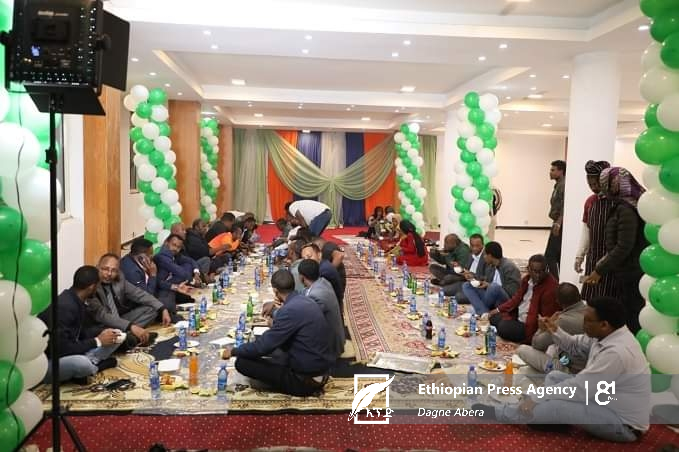
Iftar is beyond filling the belly. It is not also about having dinner. It is a partaking of a combination of spiritual and physical food. Iftar is an Arabic word, which literally means “to break”. In the Islamic context, it means to break the fast, to eat and drink in the evening after the daylong fast. According to Islamic teachings, there are five pillars of Islam. Fasting in the month of Ramadan is one of the five pillars.
Iftar is like a dinner, but it has something to differ from the ordinary dinner for it is spiritual in its nature. As to Abubeker Mohammed, a Muslim in Addis Ababa, Iftar is a good experience to all Muslims to feel the true meaning of hunger.
“It is a time where a fasting man would experience hunger in the daytime and discover the importance of food and water that give us energy. After passing through a long day without food and water, a fasting man will discover the value of sharing with others and the pain of others. By the time a man enjoys his/her Iftar, S/he will be thankful to the Creator. Iftar is a source of spiritual learning and a time where an individual will discover the pain and suffering of others who could not afford food.”
Iftar ostensibly ends the time of fasting, but treating it as an end would be an underestimation. For the spiritually awakened mind, it is like a new beginning towards spiritual uplift. Such a person will analyse the experiences of the day and try to learn lessons from them. Thus, Iftar gives a glimpse of the boundless rewards that await man in the world hereafter.
Last Thursday, The Ethiopian Press Agency had arranged Iftar program at its premises for its Muslim employees. At the event, both Christians and Muslims have attended the program. Abdurezak Mohammed is a journalist at The Ethiopian Herald newspaper. For him, having such an event in the Agency is a true reflection of love and sign of tolerance.
According to Abdurezak, Iftar goes beyond filling the belly. “Sharing meals with Christian brothers and sisters has a significant meaning to me. We may have religious differences but, we have lots of things to share in common. For this very reason, I consider the day special.”
Humanity is beyond religion. For that reason, sharing meals with individuals with different religious backgrounds creates more strong bondage and social attachments.
“Ethiopian Press Agency is old as press history in the country. However, it is for the first time in 81 years the Agency prepares an Iftar meal for its employees. This is another surprising experience for me and others.”
Ethiopian Christians and Muslims have lived in tolerance and love for more than 1,400 years. Despite several attempts to stir this strong attachment, it has never been successful. This strong social attachment and tolerance had been manifesting itself for centuries. Whenever Christians build a church, the Muslim community has role in that. This participation could be in the form of providing money or directly involved in the construction process. The same is true for Christians. Whenever there are Muslim events, there is an active involvement of Christians. “Yesterday`s program at the Press Agency is a good indication for this. Despite the fact that it was Muslim brothers and sisters were the one who has direct role with Iftar, it was Christian brothers and sisters who arranged and managed the program.
Ethiopia is truly a land of tolerance and love. This is witnessed and testified by the Prophet Muhammad, when he sent the first Muslim refugees to Ethiopia.
As it is indicated in the Quran “….you will surely find that of ail people they who say: ‘We are Christians’, are closest to feeling affection for those who believe. This is because there are worshipful priests and monks among them, and because they are not arrogant.” (5:82).
This truly shows how Ethiopian Christians were (are) friendly to their Muslim brothers and sisters. Despite the fact that there were Arab neighbours with similar culture, the Prophet has preferred Ethiopia as a destination place for his followers.
According to Abdurezak, organizing events such as last Thursday`s have a key role and it is a message to those who try every means to create enmity among Ethiopians. It creates strong social bondage among people of different religions. Such kinds of events will narrow the gap of religious differences that may lead to conflict.
BY LEULSEGED WORKU
The Ethiopian Herald 30 April 2022





